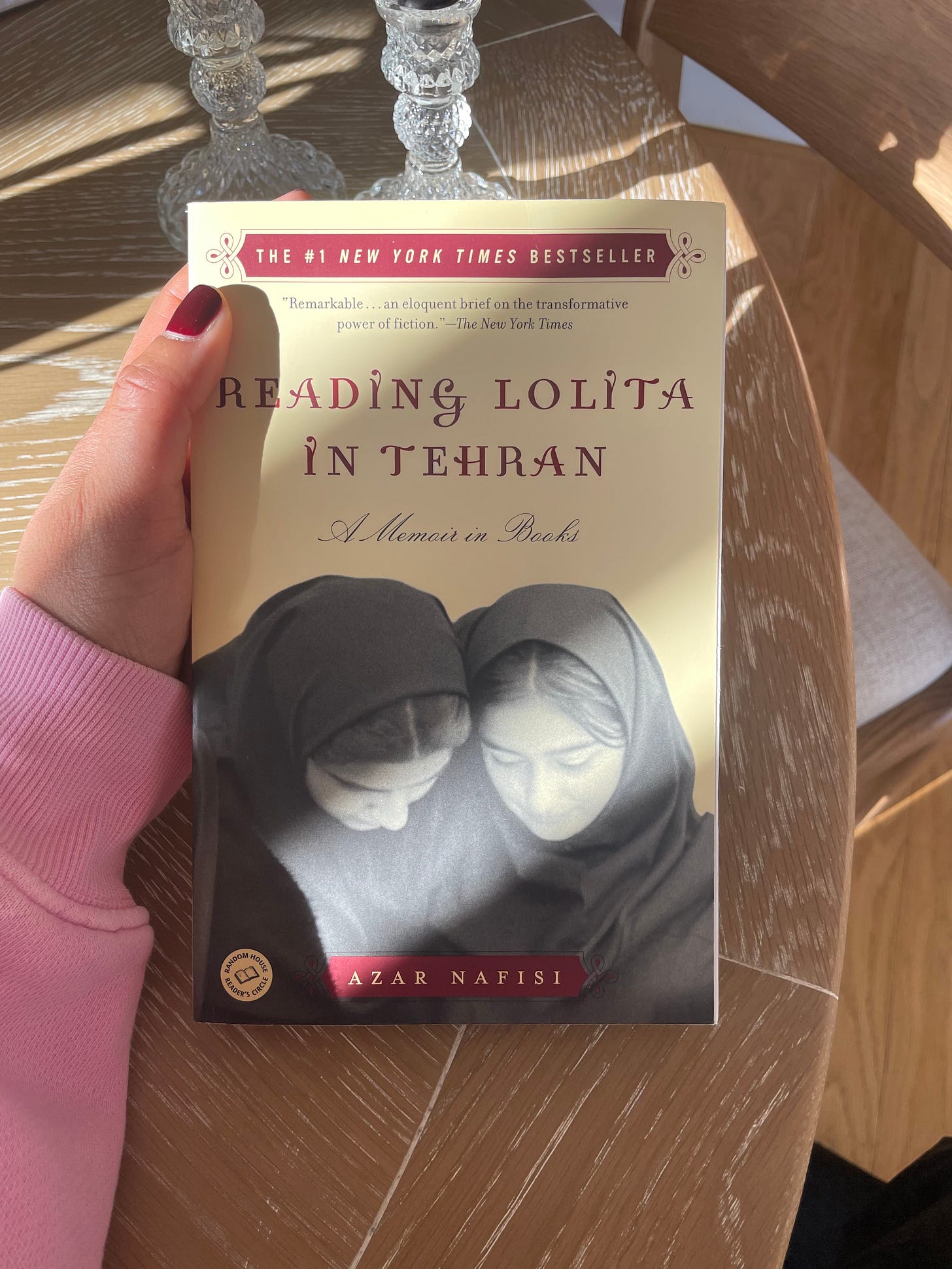We read not just to escape, but to find pieces of ourselves.
Inside: A Special Voice Note for You! 🎙️
“You get a strange feeling when you’re about to leave a place. Like you’ll not only miss the people you love but you’ll miss the person you are now at this time and this place, because you’ll never be this way ever again” - Azar Nafisi.
Hi,
I found pieces of myself in Reading Lolita in Tehran.
Two weeks ago, I held my second book club meet-up (a heartfelt thank you to those who joined!). At first glance, I wondered—what could I possibly have in common with Azar Nafisi and her students? How could I see pieces of myself in their stories? After all, I don’t live in Iran, nor have I ever had to flee from an oppressive regime—though, who knows what the future holds! I have the freedom to walk the streets in whatever I choose, paint my nails, and read Jane Austen whenever I please.
So, how did I find pieces of myself in Reading Lolita in Tehran?
We don’t read books just to escape; we read to discover pieces of ourselves, to step into other lives, and sometimes, to better understand the world around us. In our latest book club read, Azar Nafisi reminded us that literature isn’t just words on a page—it’s about memory, resistance, and survival.
Reading Lolita in Tehran reminded me that, despite our differences in religion, location, and freedoms, Nafisi, her students, and I all share something deeply human—the power of imagination, the joy of falling in love with stories, and the transformative nature of literature. Nafisi herself writes, “We read to know we are not alone.” And that’s exactly what I felt—these women, living under an oppressive regime, were not so different from us. But beyond that, it’s the small, intimate moments of everyday life that felt achingly familiar. The sweetness of falling in love, the laughter, and even the small, teasing disagreements between friends—these shared experiences connected us across worlds. Nafisi beautifully captures this when she says, “In a time of oppression, the small pleasures become our most treasured possessions.”
While parts of the book were painful to read—like the heartbreaking stories of women imprisoned or even killed just for refusing to wear the veil or comply with the inhumane rules of a new regime—I found comfort in the fact that, no matter how different our lives may seem, the things that make us human endure. Nafisi's powerful words resonate: “We are all part of the same struggle, fighting for our own freedom.” And in this, I see the universality of human rights, the shared need for dignity, and the enduring desire to live freely.
This is exactly why I started this book club—to challenge and transport us to faraway places beyond our own. My hope is that with each book we read, we’ll uncover new places, people, and cultures, drawing us closer together. Reading Lolita in Tehran did just that!
Is it strange to say that I’m already missing Nassrin, Yassi, Sanaz, Azin, Nima, Mahshid, Manna, Manna, and, of course, Professor Azar Nafisi? Their stories, their strength, their humanity—they’ve stayed with me. Thank you for teaching us that resilience can look different for each of us, for showing us that even in the darkest times, there is room for hope, for love, and for dreams. And most of all, thank you for planting the seed of connection in us that stretches beyond borders, beyond struggles, and into the heart of what it means to be human.
Our next book club read will be announced in April!
To all the new faces—welcome! I’m so excited to have you here. Here are some helpful links:
Want to support a journalist? You can upgrade your subscription here or shop my curated books here (I’ll earn a small commission!).
Thank you for being here—each of you plays a part in my journalism journey. I truly appreciate you.





Beautifully done, Lourdes! I didn’t read - but now thinking I need to add this to my stack. Love your take-aways AND hearing your voice.